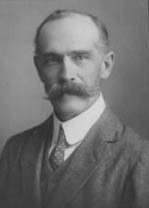John Plowright Houfton

Sir John Plowright Houfton (13 December 1857 – 18 November 1929)[1] was a British colliery owner and politician from Mansfield in Nottinghamshire. He sat in the House of Commons from 1922 to 1923.
Houfton first stood for election to Parliament at a by-election in May 1914, when he was the Liberal Party candidate for North East Derbyshire. The vacancy had been caused by the death of the sitting Member of Parliament (MP) William Harvey, who had been a Liberal-Labour candidate when first elected in 1907, and had held the seat with comfortable majorities at both elections in 1910.[2] The local Liberal Association had sought to run another Liberal-Labour candidate, and were keen that James Martin, a prominent Liberal and President of the Derbyshire Miners Association, would be their candidate. However, Martin, who was keen to stand, was required by the MFGB to pledge support to the Labour Party.[3] The Liberals therefore had to find a different candidate, and the by-election became a three-way contest, with Liberal, Labour and Conservative Party candidates.[3] Houfton lost by a margin to 314 votes (1.9%) to the Conservative candidate George Bowden, with Labour's James Martin polling 22.5% of the votes.[2]
Houfton did not stand again until 1922, when the death of Sir J. D. Rees triggered a by-election in the Nottingham East constituency. He was selected as the Coalition Unionist candidate (i.e. a Conservative standing in the support of the coalition government led by the Liberal David Lloyd George).[4] After a campaign described by The Times newspaper as "strenuous",[5] Houfton won the seat[6] with 52% of the votes, and a majority of 4,973 (25%) over the second-placed Labour Co-operative candidate.[7] He was re-elected at the general election in December 1922,[8] but was defeated at the 1923 general election[9] by the Liberal candidate Norman Birkett.[7]
In August 1926, after the general strike 1926, Houfton was strongly criticised by the Labour MP Frank Varley for negotiating a separate deal with Nottinghamshire and Derbyshire coal miners, without the support of the Miners Federation of Great Britain.[10]
He was knighted in the King's Birthday Honours in 1929, "for political and public services".[11]
References
- ↑ Leigh Rayment's Historical List of MPs – Constituencies beginning with "N" (part 3)
- 1 2 Craig, F. W. S. (1989) [1974]. British parliamentary election results 1885–1918 (2nd ed.). Chichester: Parliamentary Research Services. p. 252. ISBN 0-900178-27-2.
- 1 2 "Three-Cornered Fight In Derbyshire. Liberal-Labour Quarrel". The Times. London. 8 May 1914. p. 5, col B.
- ↑ "East Nottingham By-Election. Three Candidates In The Field". The Times. London. 19 June 1922. p. 8, col E.
- ↑ "News in Brief: East Nottingham Poll Today". The Times. London. 29 June 1922. p. 17, col G.
- ↑ "News in Brief: East Nottingham result. Coalition candidate returned". The Times. London. 30 June 1922. p. 10, col F.
- 1 2 Craig, F. W. S. (1983) [1969]. British parliamentary election results 1918–1949 (3rd ed.). Chichester: Parliamentary Research Services. p. 208. ISBN 0-900178-06-X.
- ↑ The London Gazette: no. 32775. p. 8708. 8 December 1922. Retrieved 14 November 2010.
- ↑ "First Polls". The Times. London. 7 December 1923. p. 12, col A.
- ↑ "Position In The Coalfields. Varying Attitude Of Miners., The Mansfield Area". The Times. London. 23 August 1926. p. 12, col D.
- ↑ The London Gazette: (Supplement) no. 33501. p. 3666. 31 May 1929. Retrieved 14 November.
External links
- Hansard 1803–2005: contributions in Parliament by John Houfton
- The Houfton Brothers and Mansfield: http://www.ourmansfieldandarea.org.uk/page_id__202_path__0p3p.aspx
| Parliament of the United Kingdom | ||
|---|---|---|
| Preceded by Sir J. D. Rees |
Member of Parliament for Nottingham East 1922 – 1923 |
Succeeded by Norman Birkett |